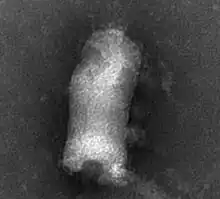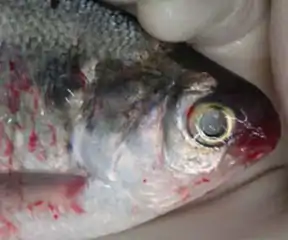| Novirhabdovirus | |
|---|---|
 | |
| Negative stain electron micrograph of Piscine novirhabdovirus | |
| Virus classification | |
| (unranked): | Virus |
| Realm: | Riboviria |
| Kingdom: | Orthornavirae |
| Phylum: | Negarnaviricota |
| Class: | Monjiviricetes |
| Order: | Mononegavirales |
| Family: | Rhabdoviridae |
| Subfamily: | Gammarhabdovirinae |
| Genus: | Novirhabdovirus |
| Species[1] | |
| |
Novirhabdovirus is a genus of the family Rhabdoviridae containing viruses known to infect aquatic hosts. They can be transmitted from fish to fish or by waterborne virus, as well as through contaminated eggs. Replication and thermal inactivation temperatures are generally lower than for other rhabdoviruses, given the cold-blooded nature of their hosts. Hosts include a large and growing range of marine and freshwater fish.[2][3]
A common characteristic among novirhabdoviruses is the NV gene, an approximately 500-nucleotide-long gene located between the glycoprotein (G) and polymerase (L) genes. The expected protein encoded by the NV gene is not found in the virions, leading to its being named a "nonvirion" (NV) protein. This is the origin of the genus name Novirhabdovirus.[4]
References
- Genus: Novirhabdovirus. ICTV Report. Academic Press. Retrieved on 2020-09-02.
- ICTVdB Virus Description: 01.062.0.06. Novirhabdovirus. ICTVdB - The Universal Virus Database, version 3. Retrieved on 2007-07-15.
- ↑ "Virus Taxonomy: 2020 Release". International Committee on Taxonomy of Viruses (ICTV). March 2021. Retrieved 19 May 2021.
- ↑ Mortensen HF, Heuer OE, Lorenzen N, Otte L, Olesen NJ (September 1999). "Isolation of viral haemorrhagic septicaemia virus (VHSV) from wild marine fish species in the Baltic Sea, Kattegat, Skagerrak and the North Sea". Virus Res. 63 (1–2): 95–106. doi:10.1016/S0168-1702(99)00062-3. PMID 10509720.
- ↑ Whelan, Gary E. Viral Hemorrhagic Septicemia (VHS) Briefing Paper Michigan Department of Natural Resources. Retrieved on 2007-07-15.
- ↑ Johnson, Marc C.; Benjamin E. Simon; Carol H. Kim & Jo-Ann C. Leong (March 2000). "Production of Recombinant Snakehead Rhabdovirus: the NV Protein Is Not Required for Viral Replication". Journal of Virology. 74 (5): 2343–50. doi:10.1128/JVI.74.5.2343-2350.2000. PMC 111716. PMID 10666265.
External links
Further reading
- Afonso, Claudio L.; Amarasinghe, Gaya K.; Bányai, Krisztián; Bào, Yīmíng; Basler, Christopher F.; Bavari, Sina; Bejerman, Nicolás; Blasdell, Kim R.; Briand, François-Xavier (2016-08-01). "Taxonomy of the order Mononegavirales: update 2016". Archives of Virology. 161 (8): 2351–2360. doi:10.1007/s00705-016-2880-1. ISSN 1432-8798. PMC 4947412. PMID 27216929.
